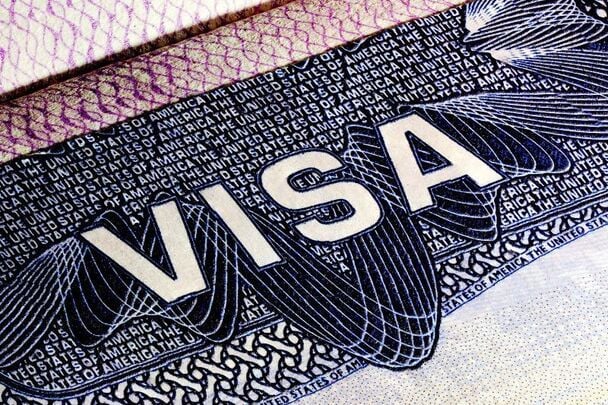Ireland's Department of Foreign Affairs said it is monitoring the situation after Politico reported on Tuesday, May 27, that US Embassies and consular sections are being ordered to pause scheduling new interviews for student visas.
"We are aware of reports that the US has instructed its diplomatic missions globally to pause new appointments for interviews for certain categories visas, including student visas," a spokesperson for Ireland's Department of Foreign Affairs (DFA) told IrishCentral on Wednesday.
"It is important to recall that US immigration policy is a matter for the US authorities.
"DFA officials have been in contact with the US Embassy on the matter, to assess possible impact on our citizens, in particular on students planning to travel in the coming months. We will continue to monitor this unfolding situation very closely.
"Our understanding at this stage is that existing appointments have not been cancelled and that new applicants can continue to submit applications."
The statement from Ireland's DFA comes in response to a query from IrishCentral regarding the report about a pause in US visa interviews published on Politico on Tuesday.
According to Politico, a cable signed by US Secretary of State Marco Rubio said: “Effective immediately, in preparation for an expansion of required social media screening and vetting, consular sections should not add any additional student or exchange visitor (F, M, and J) visa appointment capacity until further guidance is issued septel [separate telegram], which we anticipate in the coming days."
Many Irish people will be familiar with the J1 visa, a nonimmigrant visa also known as the Student Work and Travel Programme, the US-Ireland Holiday Working Agreement, or simply the J1 programme.
Ireland's DFA describes the J1 programme as a "reciprocal cultural exchange arrangement between the US and Ireland Governments, allowing American and Irish students to work and travel in each other’s countries."
The DFA adds: "The programme has been a longstanding and tremendously successful part of the Irish-US bilateral relationship and continues to be so, with thousands of Irish nationals availing of the J1 visa every year to work and travel in the USA."
In 2022, there were 6,655 J1 participants from Ireland. More than half - 3,660 - participated in the 'Summer Travel/Work' program. Ireland's DFA said last week that close to 5,500 Irish students are taking part in the J1 programme this year.
Given the time of the year the reported cable from the US State Department was issued, most Irish J1 applicants would have already had their interviews booked or completed and therefore are not likely to be impacted by the potential pause in scheduling new interviews.
The reported cable was asked about on Tuesday during a US State Department Press Briefing with spokesperson Tammy Bruce.
Bruce said the matter had not yet been discussed publicly and that the material was likely leaked.
However, she continued: "What I can remind everyone of, which we’ve discussed for months here, is that we use every tool in our tool chest to vet anyone coming in who wants to come into this country, and in order to do so has to apply for a visa to gain access to our nation."
She continued: "Every sovereign country has a right to know who is trying to come in, why they want to come in, who they are, what they’ve been doing, and at least hopefully within that framework determine what they will be doing while they’re here.
"That’s nothing new, and we will continue to use every tool we can to assess who it is that’s coming here, whether they are students or otherwise."
When asked for comment on the reported cable on Wednesday, the US State Department's Press Office told IrishCentral that it does not comment on internal communications.
However, the press office added: "The Trump Administration is focused on protecting our nation and our citizens by upholding the highest standards of national security and public safety through our visa process.
"Every visa adjudication is a national security decision. Every prospective traveler to the United States undergoes interagency security vetting. Prohibiting entry to the United States by those who might pose a threat to US national security or public safety is key to protecting US citizens at home.
"The Department’s scheduling of nonimmigrant visa interview appointments is dynamic. An embassy or consulate’s capacity reflects the time required for consular officers to adjudicate the cases before them in full compliance with US law, including to ensure applicants do not pose a security or safety risk to the United States.
"Since 2019, the Department of State has required visa applicants to provide social media identifiers on immigrant and nonimmigrant visa application forms. We use all available information in our visa screening and vetting. All visa applicants, no matter the visa type and where they are located, are continuously vetted. Security vetting runs from the time of each application, through adjudication of the visa, and afterwards during the validity period of every issued visa, to ensure the individual remains eligible to travel to the United States."
The report about a potential pause in US student visa interviews comes just days after Ireland's DFA launched its summer travel campaign, which features a message for young people to ‘Make the Right Memories.'
Launching the campaign, the DFA noted that the number of consular assistance cases it handled has increased by 22% so far this year.
Ireland's Tánaiste and Minister for Foreign Affairs and Trade Simon Harris highlighted safety measures, which include researching local laws, culture, and customs.
Make the Right Memories if you’re travelling overseas this summer!
Visit https://t.co/KU2qtSFr3W for the most up-to-date travel advice on more than 200 countries and territories.#KnowBeforeYouGo #TravelWise #MakeTheRightMemories pic.twitter.com/bZBmNv6Bou
— Irish Foreign Ministry (@dfatirl) May 23, 2025
Last month, the Union of Students in Ireland (USI) cautioned Irish students heading to the US on J1 "to be cautious and informed about the potential risks involved in activism while on a J1 visa."




Comments